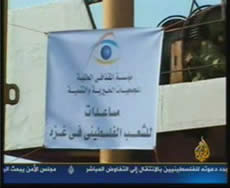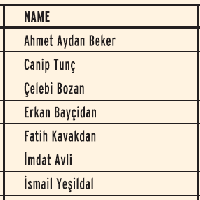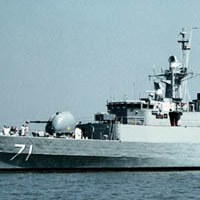Wed, July 14, 2010 | Intelligence and Terrorism Information Center
Flotillas and Convoys Update
Libya
At 1900 hours on July 11 the Amalthea (whose name has been changed to Amal (“hope”) set sail from the Greek port of Lavrio (50 kilometers, or 31 miles, from Athens) en route to the Gaza Strip. The voyage was organized by a Libyan charitable society called the Gaddafi International Charity and Development Foundation, directed by Saif al-Islam (“the sword of Islam”) Gaddafi, son of Libyan ruler Muammar Gaddafi.[1] There were conflicting reports regarding its final destination, however, in the end it sailed to El Arish.
Hamas sources continued to call for the ship to reach the Gaza Strip. That is in line with the movement’s basic desire for a media-covered confrontation (modeled on the Mavi Marmara), not for an arrangement which will make it possible to bring humanitarian assistance to the Gaza Strip. For example:
* Hamas spokesman Sami Abu Zuhri said every alternative suggestion should be rejected, including sailing the ship to the port of El Arish, because “the goal is not only to bring humanitarian assistance but the complete lifting of the siege of the Gaza Strip and the establishment of a sea lane to break the continuing maritime blockade.” He said that the arrival of the ship meant bringing “the intifada of the ships” to life (Al-Aqsa TV, July 11, 2010).
* Ahmed Yussuf, deputy foreign secretary in the de facto Hamas administration and a member of Hamas’ Popular Committee to Break the Siege, said that the committee had completed preparations to receive the ship in the Gaza port (BBC and Hamas’ Palestine-info website, July 13, 2010).
* According to the media, the United States exerted pressure on Libya to avoid a confrontation with Israel. P. J. Crowley, a spokesman for the American state department said that “We, along with our partners in the in the Quartet, urge all those wishing to deliver goods to do so through established channels so that cargo can be inspected by the government of Israel, and transferred via land crossings into Gaza. We have urged the Libyan government to avoid unnecessary confrontations. We call on all parties to act responsibly in meeting the needs of the people of Gaza”[2] (ITIC italics) (VOA News, July 13, 2010).
Other Initiatives
There are other initiatives to organize aid flotillas and convoys to the Gaza Strip, some of which plan to transfer the goods through Egypt:
* Lebanon: The sailing of the Lebanese flotilla is still delayed, the result of administrative and logistic difficulties. The organizers have currently lowered the high media profile which accompanied the preparations. So far no definite date has been set for the ships to sail.
* Europe
• The so-called European Campaign to Lift the Siege, which participated in the Mavi Marmara flotilla, said in an announcement that following the large number of requests to join Freedom Flotilla 2, its sailing may be postponed slightly until the beginning of August 2010. According to the announcement, so far 9,000 people have signed up to participate, and a large number of ships can be assumed. The organization also claimed that the flotilla would bring “surprises” for Israel (Hamas’ Palestine-info website, July 6, 2010). One of the ships will carry 400 women activists from Europe, Asia, Latin America, and the Arab world, and its cargo will consist of humanitarian assistance for the women of the Gaza Strip (Al-Alam TV, July 7, 2010).
• The Miles of Smiles convoy, carrying medial and possibly other aid, is expected to reach Egypt on July 25 or 27 and to enter the Gaza Strip two days later. Apparently there are 30 representatives from European institutions participating in the convoy (Hamas’ Palestine-info website, July 13, 2010).
* Libya: The so-called Libyan Coordinating Committee in Support of the Palestinian People said in an announcement that at the beginning of next week it would send an aid convoy overland from Libya to the Gaza Strip. The convoy would include 20 trucks carrying basic foodstuffs, drugs and medical equipment, and representatives from various organizations and doctors would participate (Libyan News Agency, July 13, 2010).
* Yemen: The so-called Popular Yemeni Authority to Support the Palestinian People began collecting donations to organize a flotilla of four ships. They are supposed to set sail from Yemen at the beginning of August. Muhammad al-Hamzi, a member of the Yemeni Parliament who participated in the Mavi Marmara flotilla (and was photographed aboard the ship brandishing a dagger), claimed that the Yemeni people had responded enthusiastically and had a strong desire to participate in the flotilla. He said that the Turkish flotilla “strengthened our faith that our objectives will only be achieved by sacrifice, a firm stand and patience.”
* Jordan: On July 13 a farewell ceremony was held for the Jordanian convoy Ansar 1, which is supposed to leave Jordan for Egypt. According to the organizers, the convoy is planning to go to Egypt and enter the Gaza Strip through the Rafah crossing. Abd al-Fatah, convoy chairman, said that there would be 150 participants, some of them members of the Muslim Brotherhood. Sixteen women will ago participate. The convoy will carry medical equipment, drugs, building materials and the cornerstone for a children’s hospital which will be built in the town of Dir al-Balah (Al-Jazeera TV, July 12, 2010).
Germany Outlaws the Turkish Islamic Organization IHH
The German interior minister announced that the Turkish IHH operating in Germany has been outlawed because of its ties to Hamas. He said that IHH was registered in Frankfurt, transferred large sums of money to Hamas, and since 2003 had been designated as a terrorist organization by the European Union. He noted that the decision to outlaw the organization had been made after a year-long investigation (Agence France-Presse and other media, July 12, 2010).
The American State Department is also examining the inclusion of IHH in its list of terrorist organizations. According to a question at the July 7 State Department briefing, a bipartisan group of 87 senators sent a letter to the President regarding his support for Israel. In the letter, they called on him to consider putting the Turkish group, the IHH, on the list of Foreign Terrorist Organizations after an examination of the intelligence community, the State Department, and the Treasury Department. Mark C. Toner, acting Department spokesman, said he believed they were looking at the IHH, but that it was a long process to designate an organization as a foreign terrorist organization.[3]
The Crossings
In June 3,072 trucks carrying merchandise entered the Gaza Strip from Israel.
Easing Restrictions Leads to Gazan Fears of Israeli Competition
According to reports in the Arab media, Israel’s policy of easing the restrictions on goods which can be imported into the Gaza Strip will lead to a glut of products on the Gazan markets and a fall in prices. A clothing dealer claimed that there was an “unprecedented abundance of goods” in the Gaza markets. He also claimed that clothing sold in the Gaza Strip arrived both through the tunnels and the Israeli crossings (Al-Ayam, July 5, 2010). However, there are relatively few buyers, perhaps because Hamas has not yet paid the salaries of public sector employees.
Sources in the Gaza Strip’s private sector said they were afraid Israel’s policy of easing restrictions would lead to competition with goods from Israel, and called for limiting imports from Israel. For example, the wood industry claimed that imports of furniture had to be limited. Soft drink manufacturers in the Gaza Strip said they feared they would have to close their factories because of the new Israeli policy, which allowed soft drinks to be imported. They claimed that they could meet the needs of the local market but could not compete with the prices of Israeli products, and called on the de facto Hamas administration to keep Israeli soft drinks out of the Gaza Strip (Hamas’ daily Felesteen, July 4, 2010).
Hamas Criticizes Possible Implementation of the Agreement on Movement and Access
The de facto Hamas administration reacted strongly to statements made in the Palestinian Authority regarding the possible implementation of the 2005 Agreement on Movement and Access, known as the Gaza crossings agreement. Hamas spokesman Sami Abu Zuhri claimed that Israel’s desire to restore the crossings agreement with the Palestinian Authority was “part of an Israeli, Arab and European plot to restore the rule of the Palestinian Authority to the Gaza Strip.” Atef Adwan, a Hamas member of the Palestinian Legislative Council, claimed that the Palestinian Authority was motivated by the desire to profit from the taxes on goods entering the Gaza Strip and emphasize its part in “lifting the siege” (Al-Risala, July 9, 2010).
Tension Between Egypt and the Hamas Regime
Its continuing tension with the de facto Hamas administration has led Egypt to make efforts to end the crisis: Hamas’ daily Felesteen reported that a high-ranking “senior Egyptian” is expected to visit the Gaza Strip in the near future. During his visit he will deal with relations between the sides, the internal Palestinian reconciliation and the deal for the release of abducted Israeli soldier Gilad Shalit (Felesteen, July 5, 2010).
In the meantime, Egyptian security forces continue their efforts to prevent weapons from being smuggled into the Gaza Strip. The Egyptian authorities reported they had located and destroyed 400 tunnels since the beginning of the year, nine of them recently, and that a large quantity of merchandise for smuggling into the Gaza Strip had been confiscated (Qudsnet, July 4, 2010). It was also reported that Egyptian security forces discovered a weapons stockpile ready to be smuggled into the Gaza Strip, which included half a ton of standard explosives, mortar shells and anti-tank rockets (Ma’an News Agency, July 5, 2010).
Notes:
1 For further information read the July 14, 2010 post, “The Libyan Ship Intifada“.
2 voanews.com.
3 state.gov.



 RSS
RSS






















Flotillas and Convoys to the Gaza Strip #israel #gaza #flotilla #hamas http://j.mp/9uzpkR
RT @CrethiPlethi: Flotillas and Convoys to the Gaza Strip #israel #gaza #flotilla #hamas http://j.mp/9uzpkR